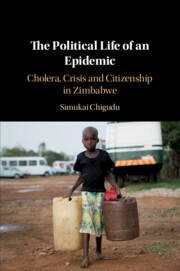Book contents
- The Political Life of an Epidemic
- The Political Life of an Epidemic
- Copyright page
- Dedication
- Contents
- Figures
- Table
- Preface
- Abbreviations
- Map of Zimbabwe
- Introduction
- 1 The Making of Urban (Dis)Order
- 2 ‘When People Eat Shit’
- 3 Emergency Politics
- 4 The Salvation Agenda
- 5 ‘People Were Dying Like Flies’
- Conclusion
- References
- Index
3 - Emergency Politics
Cholera as a National Disaster
Published online by Cambridge University Press: 10 January 2020
- The Political Life of an Epidemic
- The Political Life of an Epidemic
- Copyright page
- Dedication
- Contents
- Figures
- Table
- Preface
- Abbreviations
- Map of Zimbabwe
- Introduction
- 1 The Making of Urban (Dis)Order
- 2 ‘When People Eat Shit’
- 3 Emergency Politics
- 4 The Salvation Agenda
- 5 ‘People Were Dying Like Flies’
- Conclusion
- References
- Index
Summary
This chapter explores the manifold ways in which the cholera epidemic became a terrain of polarised political struggles at national and international levels in the areas of humanitarianism, security and governance. This polarisation reached extreme levels. On one hand, the main opposition party, the Movement for Democratic Change (MDC), along with prominent outside observers – including the International Crisis Group and a high-level panel convened by Physicians for Human Rights – described cholera as the result of ‘the systematic violation of a wide range of human rights’ and evidence of a ‘failing’ state under the stewardship of the ruling party, ZANU(PF). By contrast, elements of the Zimbabwean government decried the outbreak as racist ‘biological warfare’ from the West intended to bring about regime change. Through the allocation of culpability for the cholera outbreak, I argue that a more fundamental political debate about power and legitimacy to govern was taking place as evidenced by international accusations of ‘state failure’ vis-à-vis nationalist claims to ‘state sovereignty’. Furthermore, I argue that this polarisation was deleterious in the extreme because it delayed the humanitarian relief effort, promoted non-engagement between the Zimbabwean and Western governments, and narrowed down the avenues for third-party diplomatic mediation.
- Type
- Chapter
- Information
- The Political Life of an EpidemicCholera, Crisis and Citizenship in Zimbabwe, pp. 93 - 122Publisher: Cambridge University PressPrint publication year: 2020

